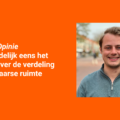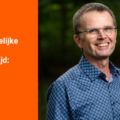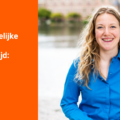
This spoken column was presented on Friday, May 16 by advisor Daan Bos during the kickoff of Wij Maken Nederland, a movement that wants to put spatial planning on the political agenda and organize social dialogue about it.
The Netherlands has a tradition of grand spatial projects. We have the Delta Works, with Flevoland we have stamped an inhabited island out of the water, we manage dikes fanatically and have an enormous fine-meshed railway network. Our cities are built on piles, our villages on resilient peat and we have become rich with gas extraction - and poor at the same time. But that is another story.
This story is about the biggest dreams we have for the Netherlands. All examples of this come from the time when the Netherlands was still an undeveloped peat landscape. A canvas that still had to be filled. Today's reality is different. That canvas is completely filled. Where something has to be added, something actually has to go. Space has become scarce.
In this scarcity lies a task for politicians and political parties. They know: we win elections when we pay attention to economic and cultural issues. That is where the emotion lies: in your wallet and in your identity. But many issues of our time inevitably have to do with the distribution of scarce space: from strengthening the energy grid to combat grid congestion, and creating living space without nitrogen locks to training grounds for defense.
We turn spatial planning into an abstract theme of laws, rules, arrangements, destinations and notes. While space is the most concrete thing you can imagine: you really notice it when that tree in front of your house disappears, when it is deathly quiet in front of your door because your street is closed to cars, or when a newly completed residential area finally helps your child out of the housing shortage.
I am actually a bit of an odd one out here, because spatial planning is not my field. That is communication. I help organisations to put and keep social issues on the agenda of politics and the media. But I am concerned about the scarcity of space in our country. I live in Utrecht myself and the debate about the widening of the A27 near Amelisweerd is an example where the pain of spatial choices becomes visible. There it does lead to political debate in society. Because once the trees are gone, they don't just come back.
And that is exactly what makes spatial planning a challenging subject from my perspective. You can see it, grab it, photograph it, visualize it, you can walk through it. Much more concrete than many other issues that I work with on a daily basis. And at the same time, the choices are about how the space should look in 5, 10, 20 years. For some people, the end of the month is already unimaginable.
It is therefore up to us, dear people, to make that spatial future conceivable. We are here together because we see: that distribution of scarce space needs to receive more attention. And political parties need to start seeing that again. Scarce space needs to become an election theme, about which they enter into debate, formulate visions and create support. The risk if that does not happen is that space will be left unmanaged to whoever comes first. That we will soon find ourselves in a country in which spatial proliferation is suffocating, instead of refreshing.
I know you had plenty to say about it, but an idea like Rob Jetten's to build 10 new cities is what we need. Because it gets people talking: why, why not? Where could that be? And how? You are indispensable in that debate, because you are involved in the design, consideration, development and shaping of spatial planning on a daily basis. Especially now in the run-up to the Spatial Planning Memorandum and the municipal elections.
My appeal to you is: get involved in the social debate! Write opinion pieces in which you get angry or come up with new ideas, let a journalist join a project or residents' evening to show how spatial choices are made. Or organize a debate with aldermen or party leaders in the run-up to the municipal elections in March next year.
Space must become relevant again, and we achieve this with repetition, repetition, repetition. By being present in different places and showing what is happening in beautiful Netherlands, we also make the scarce space politically relevant. A real social debate about the scarce space is incredibly important to make that canvas of the Netherlands a beautiful painting again. The bravado and vision that brought us the Delta Works, Room for the River and Flevoland are the tradition we can continue on. Let us build on those shoulders and encourage our politicians to do the same. Then we can build a collective masterpiece together.
Inspired to contribute to the social debate on scarce space? Issuemakers is happy to help you with the social positioning of your organization, writing an opinion piece, drafting a core message or another request for assistance. Contact us via or +31 (0)20 3455088.





